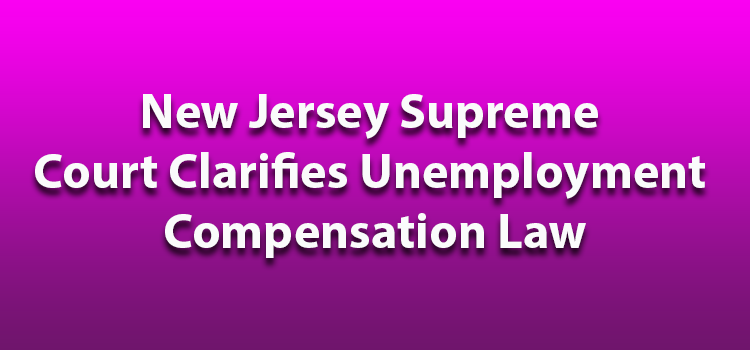In McClain v. Board of Review, (A-52-17/080397) (Decided April 29, 2019), the Supreme Court of New Jersey clarified when employees are entitled to unemployment insurance (UI) benefits. It held that an individual who has accepted an offer of employment from a second employer only to have the offer rescinded through no fault of her own before the start date, but after resignation from the first position, is entitled to UI benefits.

New Jersey’s Unemployment Compensation Law
Under New Jersey’s Unemployment Compensation Law (UCL or Act), an employee terminated from employment after working a certain number of weeks is ordinarily entitled to unemployment insurance (UI) benefits. Under N.J.S.A. 43:21-5(a), an employee who voluntarily leaves her employment without just cause is not entitled to such benefits.
To address the inequity facing those employees who served a substantial period with one employer and then voluntarily left for an equal or better opportunity with another employer, only to be terminated shortly afterwards, the Legislature amended the UCL in 2015. As amended, N.J.S.A. 43:21-5(a) qualifies an employee to receive UI benefits if she “voluntarily leaves work with one employer to accept from another employer employment which commences not more than seven days after the individual leaves employment with the first employer.”
Facts of McClain v. Board of Review
The consolidated appeals involved UI claims by Patricia McClain and Cynthia Blake, both of whom had accepted an offer of employment from a second employer only to have the offer rescinded before the start date, but after resignation from the first position. In both cases, the Deputy Director of Unemployment Insurance denied their claims. The Appeal Tribunals subsequently affirmed because McClain and Blake did not commence their new employment within seven days of leaving their former employer, thus disqualifying them for benefits under N.J.S.A. 43:21- 5(a). The Board of Review affirmed the Appeal Tribunal in both cases. McClain and Blake separately appealed.
In McClain’s case, the appellate panel reversed. The panel’s plain reading of N.J.S.A. 43:21-5(a) led it to conclude that so long as the employee accepts the job offer, which is set to begin within seven days of leaving the first employer, she is entitled to UI benefits if the offer is rescinded and she is rendered unemployed. The panel determined that the clear language of the statute governs and is supported by the legislative history and the remedial purposes of the UCL.
In Blake’s case, the appellate panel affirmed the Board of Review’s decision to deny Blake UI benefits because Blake voluntarily quit her job with her first employer and never started her second employment due to the rescinded offer. The panel construed the phrase “employment which commences” to mean that the employee must actually begin work with the second employer to be entitled to UI benefits. The Blake panel believed that the first
employer’s UI account would be charged for UI benefits paid to a claimant who became unemployed as a result of the second employer’s rescission of the job offer, and concluded that the first employer would have difficulty “challeng[ing] whether the claimant actually had received an offer of employment and what were its terms.”
NJ Supreme Court’s Decision in McClain v. Board of Review
The Supreme Court of New Jersey concluded that the McClain and Blake are entitled to unemployment benefits. In support, the court emphasized that (1) they qualified for UI benefits at their former employment at the time of their departure, (2) they were scheduled to commence their new jobs within seven days of leaving their former employment, and (3) their new job offers were rescinded through no fault of their own before the start date.
In reaching its decision, the New Jersey Supreme Court acknowledged that the statute and its legislative history failed to provide a conclusive answer. It went on to base its decision on “the underlying objective of the Unemployment Compensation Law and the equitable purpose” of N.J.S.A. 43:21-5(a).
“Providing UI benefits to an employee who voluntarily leaves her first employment based on an equal or better offer from a second employer, who then rescinds the offer before the start date of her new employment, fulfills the Legislature’s objective in amending N.J.S.A. 43:21-5(a),” Justice Barry Albin wrote. “We therefore determine that the two employees in the cases before us have earned the right to UI benefits.”
